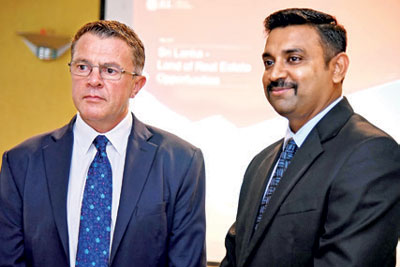15 Jun 2017 - {{hitsCtrl.values.hits}}
By Chandeepa Wettasinghe
Sri Lanka’s luxury apartment segment, which has been drawing negative sentiments from the state and private sectors alike, is not built on shaky fundamentals and there are avenues to mitigate the potential risks, according to the Fortune 500 company, Jones Lang Lasalle (JLL), which specializes in real estate. 
“The kind of supply that has been announced and is being constructed is simply higher than what the average rate of absorption is, which is why the gap. The concern over the current situation probably means that the absorption could take slightly longer than what it is right now. We see no major concern,” JLL Lanka (Private) Limited Transactions Head Sunil Subramanian said.
Speaking at a JLL report launch in Colombo, he pointed out that the average absorption rate of luxury apartments has been growing consistently year-on-year and that he would not term the current situation of 3,740 units in the pipeline as “oversupply”.
Subramanian said that while 714 luxury apartment units were sold in 2015 and 2016, JLL is not aware of how many remain unsold since it is difficult to get data out of the developers. According to JLL, Sri Lanka’s ranking in the JLL Global Real Estate Transparency Index is 69 out of 109 countries.
However, JLL remains positive over the overall real estate development scene of Sri Lanka.
“The title of our report is ‘Sri Lanka - Land of Real Estate Opportunities’. We stand by that. We accept that there are challenges and trips along the way, but the outlook is positive for the potential in the market here,” JLL Lanka (Private) Limited Managing Director Steven Mayes said.
Subramanian expressed some worry over the rising land and construction costs and the rate of development of common infrastructure such as sewerage and waste disposal. He also noted that the immediate vicinity of the main business district is saturated with luxury apartments.
“Colombo 1, 2, 3 are not big (enough) to take more development. There’s a need for developments to happen in other places. We’re seeing some activity but it has to happen more,” he added.
The Central Bank recently expressed caution over the formation of a possible property bubble. The statement drew strong criticism from an apartment developer, who said that if a bubble exists, it is in the luxury apartment segment.
Ratings agency Fitch Ratings too hinted about concerns in the luxury apartment segment.
Unfortunately, the debate over the existence of a possible bubble is dominated by parties closely linked to the real estate sector with differing agendas and the lack of transparency in the market precludes a clear assessment.
However, most agree that a possible bubble bursting in the luxury segment will spill over into other sectors of the economy. Mayes noted that Sri Lankan banks have a relatively low exposure to the apartment industry.
“Ninety percent of the (apartment) buyers are not leveraged,” he said.
Subramanian added that apartment developers too are not highly leveraged and at most borrow around 20 percent of the project value, since they usually purchase land with equity, then go on to construct once around 40 percent of the apartments are pre-sold, which give them adequate liquidity.
Although he said that the number of individuals in Sri Lanka who could afford luxury housing is low, he said he was not willing to comment on whether the funds being used as development equity or to purchase apartments were acquired legally or illegally.
Mayes said that 95 percent of the luxury apartment buyers are Sri Lankans and 60 percent are local residents.
He added that if a major gap in demand arises, apartments could be sold to foreigners—such as Indians and Chinese who are becoming heavily involved in the Sri Lankan economy—under the funding scheme proposed in the 2017 budget.
“That is the catalyst to open the market to foreigners,” he said.
Mayes opined that Sri Lanka is on the “precipice of a new golden era” in foreign direct investment (FDIs despite the recent poor performance of FDI to Sri Lanka, by stating that all the steps have been taken by the country.
He noted that mega projects such as the Megapolis project and China’s One Belt One Road initiative will serve to absorb luxury apartment supply; a view shared by the construction industry.
26 Nov 2024 4 minute ago
26 Nov 2024 8 minute ago
26 Nov 2024 39 minute ago
26 Nov 2024 3 hours ago
26 Nov 2024 3 hours ago